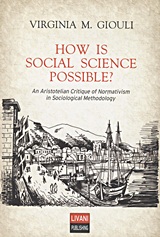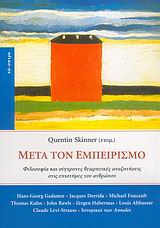
How is Social Science Possible?
How is Social Science Possible?
An Aristotelian Critique of Normativism in Sociological Methodology
Βιργινία Μ. Γκιούλη
| Έκδοση | Αθήνα, Εκδοτικός Οίκος Α. Α. Λιβάνη, 1η έκδοση, 2012 |
| Μορφή | Βιβλίο |
| Σειρά | Philosophy |
| Θέματα | Κοινωνικές επιστήμες - Φιλοσοφία και θεωρία |
| ISBN | 978-960-14-2554-2 |
| ISBN-13 | 978-960-14-2554-2 |
| Φυσική περιγραφή | 303σ., Μαλακό εξώφυλλο, 21x14εκ. |
| Τιμή | € 12.0, (Τελ. ενημ: 2012-10-02) |
| Διαθεσιμότητα | Κυκλοφορεί |
| LEADER | 22 4500 | |
| 001 | 179981 | |
| 005 | 20200829165632.792 | |
| 020 | ## | |a 9789601425542 |
| 020 | ## | |a 9789601425542 |
| 041 | 0# | |a ελληνικά |
| 082 | 14 | |a 300.01 |2 23 |
| 100 | 1# | |a Γκιούλη, Βιργινία Μ. |
| 245 | 10 | |a How is Social Science Possible? |b An Aristotelian Critique of Normativism in Sociological Methodology |c Βιργινία Μ. Γκιούλη |
| 250 | ## | |a 1η έκδοση |
| 260 | ## | |a Αθήνα |b Εκδοτικός Οίκος Α. Α. Λιβάνη |c 2012 |
| 300 | ## | |a 303σ. |b Μαλακό εξώφυλλο |c 21x14εκ. |
| 490 | 0# | |a Philosophy |
| 520 | ## | |a An Aristotelian Critique of Normativism in Sociological Methodology |
| 650 | #1 | |a Κοινωνικές επιστήμες - Φιλοσοφία και θεωρία |
| 903 | ## | |a €12.0 |
| Τίτλος | How is Social Science Possible? / Βιργινία Μ. Γκιούλη ; |
| Κύριος Συγγραφέας | Βιργινία Μ. Γκιούλη |
| Έκδοση | Αθήνα, Εκδοτικός Οίκος Α. Α. Λιβάνη, 1η έκδοση, 2012 |
| Μορφή | Βιβλίο |
| Σειρά | Philosophy |
| Θέματα | Κοινωνικές επιστήμες - Φιλοσοφία και θεωρία |
| ISBN | 978-960-14-2554-2 |
| ISBN-13 | 978-960-14-2554-2 |
| Φυσική περιγραφή | 303σ., Μαλακό εξώφυλλο, 21x14εκ. |













